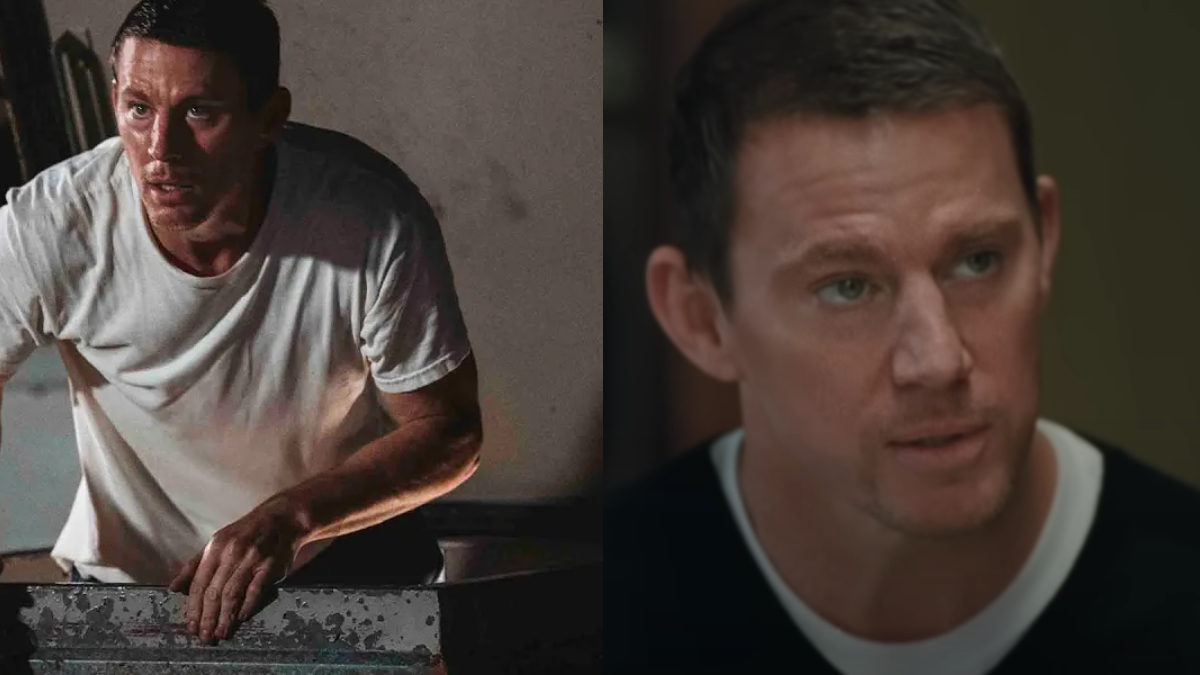Some stories already read like movies before a single frame is shot, and Roofman is exactly that kind of story. Paramount Pictures’ upcoming release, arriving in theaters October 10, 2025, dives headfirst into one of the most bizarre true crime sagas in modern American history.
It follows Jeffrey Manchester, a former Army Ranger whose fall from grace is defined not by ordinary missteps, but by a string of robberies so unconventional they almost sound like urban legend. His method was absurdly simple yet astonishingly effective: he cut holes into the roofs of McDonald’s restaurants and slipped in from above, avoiding alarms and sidestepping suspicion. That peculiar approach earned him his nickname, Roofman and cemented his reputation as both a criminal oddity and a folk curiosity.
Channing Tatum brings Manchester to the screen with a performance that balances his rugged physicality with the vulnerability of a man searching for survival, dignity, and perhaps redemption. This isn’t the story of a violent gangster or a mastermind thief, it’s about a man whose crimes were as unorthodox as his choices. Manchester never brandished a weapon in his robberies, and employees often recalled him as strangely polite. He might have been locking people in freezers during his heists, but he was also the man who offered coats to keep them warm. In that duality lies the strange allure of Roofman: he was both criminal and caretaker, both calculating and oddly human.
But the film is not content to stop with the mythology of his rooftop escapades. It plunges into the strangest chapter of all: Manchester’s prison escape and subsequent disappearance, followed by the discovery that he had been secretly living in a Toys “R” Us for six months. Imagine the absurdity of someone building a hidden life inside a temple of toys and childhood wonder, surviving on snacks, skating in the aisles, and quietly decorating walls while the outside world searched for him. This bizarre hideout feels almost like a parable of modern loneliness, an outlaw hiding in a playground of innocence, caught between survival and absurdity.
Yet the story turns more personal when Manchester meets Leigh, portrayed by Kirsten Dunst. She is a divorced mother, drawn to his charisma without realizing the layers of deception beneath his charm. Their relationship becomes the thread that pulls apart his carefully crafted secrecy, creating a fragile tension between his yearning for connection and the inevitability of his past catching up. It is here that Roofman transcends the label of a crime drama and becomes something more layered: a story about love blooming in the wrong place, about human need colliding with human flaw, and about how even fugitives crave intimacy.
Director Derek Cianfrance is the perfect choice for this material. Known for Blue Valentine and The Place Beyond the Pines, Cianfrance specializes in exploring characters who are both tender and destructive, people whose lives slip between the intimate and the catastrophic. His direction promises that Roofman will not simply recount events, but inhabit them, bringing audiences into the cramped spaces Manchester lived in, the flickering neon glow of fast-food rooftops, and the suffocating silence of hiding in a toy store after closing hours. His filmmaking thrives on contrasts, and this story is nothing if not a study in extremes: comedy and tragedy, crime and romance, absurdity and inevitability.
The ensemble cast further elevates the narrative. Alongside Tatum and Dunst are Ben Mendelsohn, LaKeith Stanfield, Juno Temple, Uzo Aduba, Melonie Diaz, and Peter Dinklage, actors known for their ability to infuse depth into even the strangest corners of a story. Their presence ensures that what could easily have been a sensationalist retelling instead becomes a textured human drama.
What makes Roofman so compelling as a cinema is its refusal to simplify. It doesn’t paint Jeffrey Manchester as a cartoon villain, nor does it lionize him as a misunderstood antihero. Instead, it captures the contradictions of a man whose ingenuity was undeniable, whose choices were reckless, and whose humanity was strangely intact even in moments of transgression. In many ways, his story reflects the fragile balancing act of American mythmaking itself, the fascination with outlaws, the desire to forgive charm, and the unease of facing the damage left in the wake of crime.
As the film heads to theaters, it brings with it questions that stretch beyond one man’s story. How far can someone run from their own past? Can love or connection redeem choices that have defined you? And what happens when desperation collides with invention in ways the law could never predict? Roofman may be a film about robberies and escapes, but at its heart it is about survival, about loneliness, and about the lengths people go to when they feel they have run out of options.
When audiences settle into their seats this October, they’ll discover a story that is as much about heart as it is about heist. It will make them laugh at the absurdity of a man living in a toy store, hold their breath at the tension of his double life, and perhaps even feel a pang of sympathy for someone who became infamous not for bloodshed, but for ingenuity. In transforming Jeffrey Manchester’s strange saga into cinema, Roofman proves that truth really is stranger than fiction, and sometimes, infinitely more moving.

